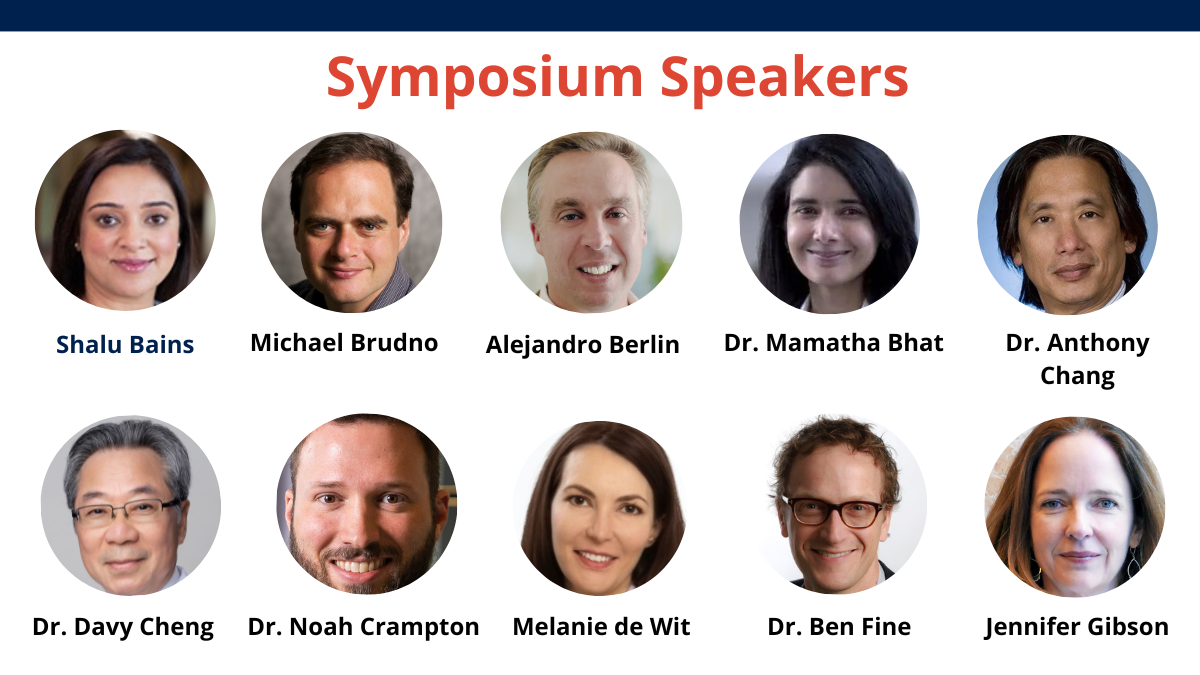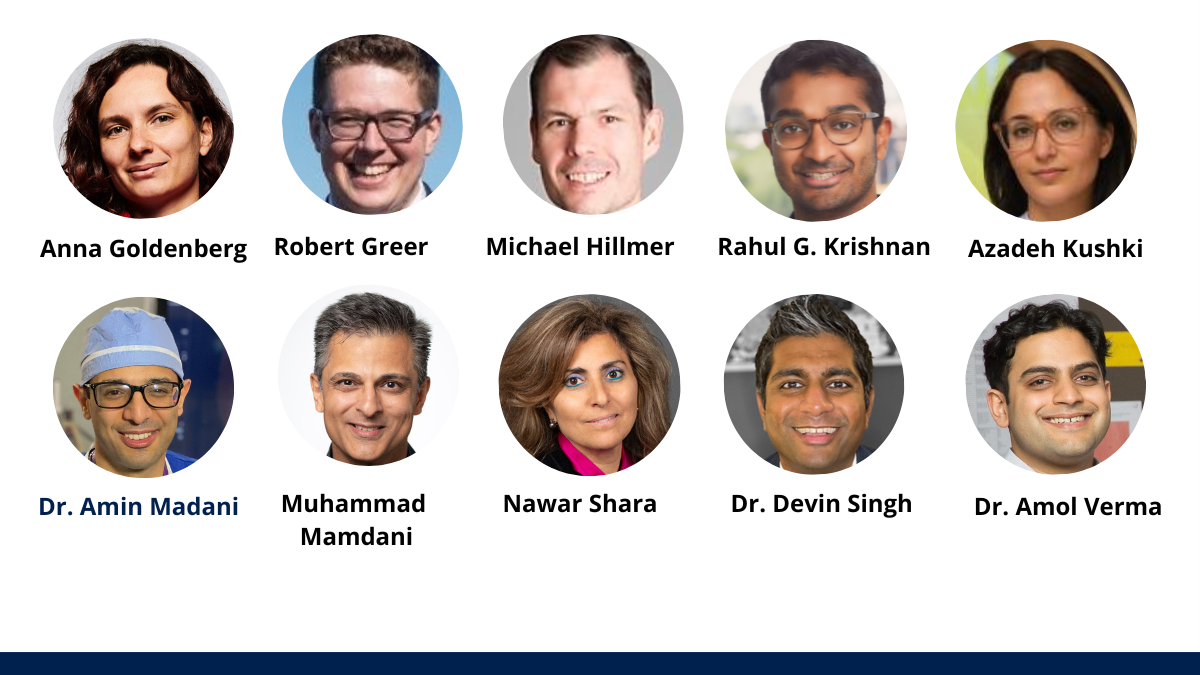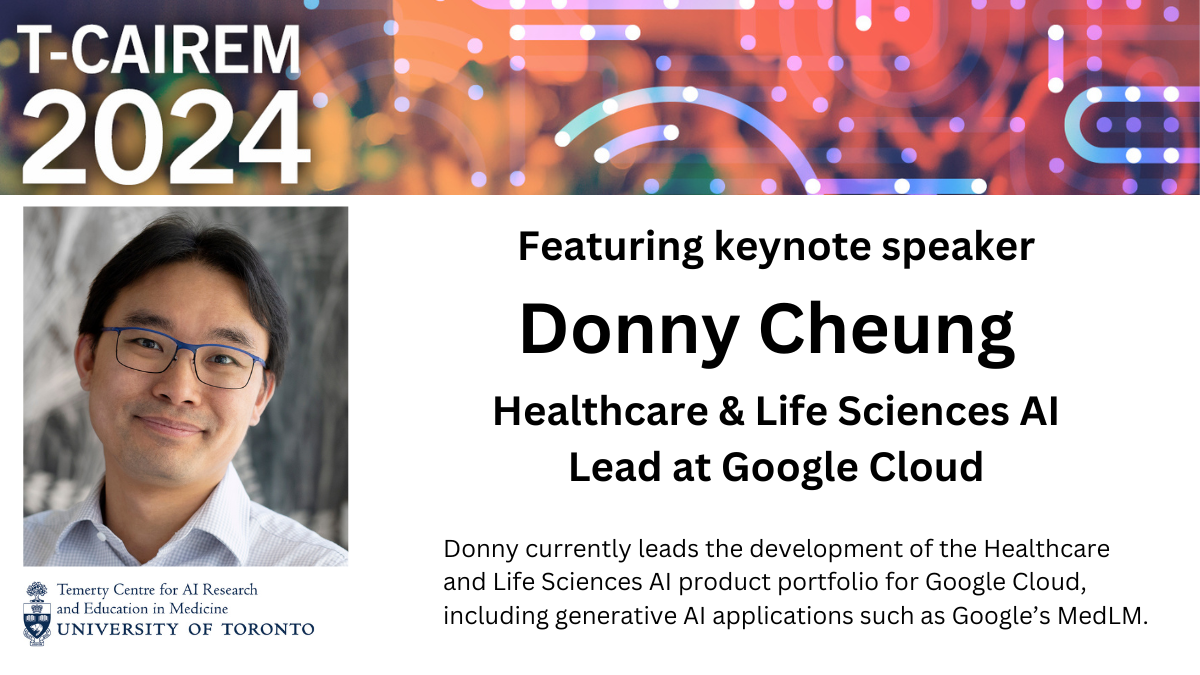
Main Second Level Navigation
Breadcrumbs
- Home
- Events
- Past Events
- Symposium 2024
- Symposium 2024 - Speakers
Symposium 2024 - Speakers
Multi-Modal Data and the Future of Health AI



Donny Cheung
Donny Cheung is passionate about building products that leverage cutting-edge capabilities in healthcare data analytics and machine learning to enable all of us to live healthier lives in a sustainable and responsible manner. He is an experienced leader who brings broad cross-functional teams together towards advancing this mission. Donny currently leads the development of the Healthcare and Life Sciences AI product portfolio for Google Cloud, including generative AI applications such as Google’s MedLM. Before Google, he worked as a senior scientist at a medical device startup in Toronto, Canada, focusing on medical imaging device design and image reconstruction algorithms. He holds a PhD in Mathematics from the University of Waterloo, with a research focus on quantum computing.
We're delighted to feature several expert speakers at the Symposium who are at the forefront of Artificial Intelligence (AI) health innovations!
Shalu Bains
Shalu is the Chief Information and Analytics Officer at Trillium Health Partners and in this role is accountable for advancing THP’s plan for digital and technology transformation to support patient care delivery, partnerships and to shape the future of care in the Mississauga and West Toronto community. Shalu is responsible for the Information Services and Performance and Business Intelligence Divisions. Shalu joined THP in 2010 prior to the merger of Credit Valley Hospital and Trillium Health Centre, and has held a variety of progressive leadership roles across the organization. She has over 15 years of progressive leadership experience both in hospital and provincial health system performance and advanced analytics. Shalu has a track record of leading technical teams to provide strategic insights and digital tools focused on improving access, quality and sustainability of health care services for patients, population health and for the diverse community she serves and lives in.
Michael Brudno
Michael Brudno is a Professor in the Department of Computer Science at the University of Toronto, as well as the Chief Data Scientist at the University Health Network (UHN). His main research interest is in the development of computational methods for the analysis of clinical and genomic datasets in particular the capture of precise clinical data from clinicians using effective user interfaces, and its utilization in the automated analysis of genomes. His work focuses on the capture of structured phenotypic data from clinical encounters, using both refined User Interfaces, and mining of unstructured data (based on Machine Learning methodology), and the analysis of omics data (genome, transcriptome, epigenome) in the context of the structured patient phenotypes, mostly for rare diseases. His overall research goal is to enable the seamless automated analysis of patient omics data based on automatically captured information from a clinical encounter, thus streamlining clinical workflows and enabling faster and better treatments.
Alejandro Berlin
Dr. Ale Berlin is a staff clinician-scientist radiation oncologist at the Princess Margaret (PM) Cancer Center. He completed his training in Chile, Israel, and Canada. His clinical practice focuses on the discovery and clinical evaluation of novel therapeutics capitalizing on genomic characterization genitourinary malignancies, and advanced molecular and MR imaging. Dr. Berlin is a PI of the NRG GU010 study investigating the use of clinicogenomic risk stratification for treatment individualization in men with localized prostate cancer. Dr. Berlin also leads a clinical initiative quantifying the human and machine performance during the clinical deployment of an in-house developed AI radiotherapy planning method for prostate cancer.
Dr. Mamatha Bhat
Dr. Mamatha Bhat completed her medical training at McGill University, Transplant Hepatology training at Mayo Clinic in Minnesota, and a PhD in Medical Biophysics at the University of Toronto. Dr. Bhat’s group has developed and is deploying ML algorithms trained on clinical and ‘omics data to optimize the long-term outcomes of transplant patients in a personalized manner. She has received the Polanyi Prize, Early Researcher Award from the Ministry of Research and Innovation, CASL/CIHR Research Excellence award, American Society of Transplantation (AST) Basic Science Career Development Award and is a Fellow of the AST.
Dr. Anthony Chang
Anthony Chang, MD, MBA, MPH, MS is a pediatric cardiologist and Medical Director of the Heart Failure Program at Children's Hospital of Orange County. Dr. Chang serves as Chief Intelligence and Innovation Officer of CHOC Sharon Disney Lund Medical Intelligence, Information, Investigation and Innovation Institute (Mi4). The Institute is the hub of medical intelligence and innovation at CHOC, and also serves as a national and international leader. Mi4 was the first institute of its kind in a children's hospital. Dr. Chang completed his Master of Science (MS) in Data Science with a sub-specialization in artificial intelligence from Stanford School of Medicine and has completed a certification on artificial intelligence from MIT. Dr. Chang has a Master's in Business Administration (MBA) in Health Care Administration from the University of Miami School of Business and a Master's in Public Health (MPH) in Health Care Policy from the Jonathan Fielding School of Public Health of the University of California, Los Angeles.
Dr. Davy Cheng
Professor Davy Cheng is the Founding Dean of Medicine and Presidential Chair Professor, School of Medicine at the Chinese University of Hong Kong, Shenzhen, China. He graduated MD at University of Toronto in 1983, and received Fellowship (Anesthesiology) at Royal College of Physicians and Surgeons of Canada (FRCPC) in 1987. In recognition of his great accomplishment and achievement in the academic health sciences in Canada and international impact, Prof. Cheng was inducted as a Fellow of the Canadian Academy of Health Sciences (CAHS) In 2007. He was also certified as CCPE (Canadian Certified Physician Executive) and was inducted as Honorary Fellow, Deutsche Gesellschaft fur Anasthesiologie und Intensivmedizin (DGAI), and the Hong Kong College of Anaesthesiologists (HKCA). Prof. Cheng is a globally recognized healthcare leader at the forefront of research, practice and healthcare policy in the fields of perioperative surgical and anesthesia care, cardiac surgery, critical care medicine, and evidence-based clinical decision-making. His pioneer work in fast-track cardiac anesthesia and recovery has become the standard of cardiac anesthesia and recovery practice around the world (citations 24109, h-index 68, i10-index 148). Since 2022, he has been twice listed in the World Top 2% Scientists list and has been featured in both the Career-long Impact Rankings and the 2021 Single-year Impact Rankings. He has been leading AI Medical Education and Curriculum reform and transforming intelligence-based clinical practice in academic health sciences centre at CUHK-Shenzhen.
Dr. Noah Crampton
Dr. Crampton is a family physician practicing at Toronto Western Family Health Team and researcher with expertise in digital health and AI in primary care. With a master's in health informatics from the University of Toronto, he co-founded and is now CEO of a budding successful start-up based in Toronto called Mutuo Health. His company is commercializing his academic research: he and his team created a state-of-the-art AI medical scribe tool called AutoScribe. Since its launch in April 2023, it is used by over 350 healthcare providers across Canada. He is passionate about formulating the ethical framework for the collection of continuously linked health data that will power the AI algorithms of the future.
Melanie de Wit
Melanie de Wit has been a lawyer working on behalf of hospitals and healthcare providers for 15 years, currently as Chief Legal Officer at Unity Health Toronto. She received her Juris Doctor at the University of Toronto and completed a Masters in Public Health at John Hopkins University. Currently the Chair of the Toronto Academic Health Sciences Network Legal table, Melanie also teaches health law and risk management within the health administration and patient safety graduate programs of the Institute for Health Policy, Management and Evaluation at the University of Toronto. Melanie is passionate about responsible innovation in healthcare, and recently designed a public/private collaboration involving the development of artificial intelligence tools in healthcare.
Dr. Ben Fine
Dr. Ben Fine is a Radiologist at Trillium Health Partners and the Quality and Informatics Physician Lead for Diagnostic Imaging. Dr. Fine obtained his medical degree as well as completing his residency and fellowship training at the University of Toronto. Dr. Fine holds a Master’s degree in Engineering from the Massachusetts Institute of Technology. His research and quality interests revolve around artificial intelligence and machine learning, diagnostic wait times, closed loop critical result notification, error-proofing, capacity prediction and other topics.
Jennifer Gibson
Professor Gibson is the Director of the University of Toronto Joint Centre for Bioethics and an Associate Professor in the Division of Clinical Public Health and the Institute of Health Policy, Management, and Evaluation at the Dalla Lana School of Public Health. Jennifer holds a PhD in Philosophy (bioethics and political theory) and has a background in biological sciences. Her research and policy work focuses on ethical issues in contemporary health institutions and systems. Jennifer has advised governments and policymakers on topics such as medical assistance in dying, public health emergencies, health technology assessment, drug funding and supply, and resource allocation. Jennifer is a member of the WHO Expert Group on Ethics and Governance of AI for Health, which released its second report on Large Multi-Modal Models earlier this year, and has recently completed a three-year term as Vice-Chair of the Ontario Health Data Council. At the Joint Centre for Bioethics, Jennifer leads the AMS-Fitzgerald Fellowship on AI and Human-Centred Leadership and founded the Ethics and AI for Good Health program, which explores and engages emerging ethics and governance issues associated with AI in healthcare and public health.
Anna Goldenberg
Dr. Anna Goldenberg is a professor in the departments of Computer Science and Laboratory Medicine and Pathobiology. She is a Varma Family Chair in Biomedical Informatics and Artificial Intelligence at SickKids Research Institute, as well as a CIFAR AI Chair at the Vector Institute. She co-chairs AI in Medicine initiatives at both UofT and SickKids. Dr. Goldenberg trained in machine learning at Carnegie Mellon University with a postdoctoral focus in Computational Biology and Medicine. The current focus of her lab is on developing and deploying machine learning models to healthcare. Dr Goldenberg’s lab is strongly committed to creating responsible AI to benefit patients across a variety of conditions.
Robert Greer
Robert Greer (BEng., MSc) is the technical lead of the Artificial Intelligence in Medicine (AIM) Initiative at SickKids. In this role, Robert is leading the design and deployment of an institutional MLOps strategy and platform to enable the deployment of AI/ML solutions across the enterprise. In addition to this role, Robert also leads the development of AtriumDB, a physiological waveform data management and analysis platform. AtriumDB combines physiological, device, and electronic health record data into a high-performance platform that enables large-scale data analysis, AI training and deployment to the bedside. AtriumDB is actively deployed in hospitals around the world including Canada, Israel, Australia, and the USA. Robert has a BEng in Software Engineering and M.Sc. in Computer Science from the University of Ontario Institute of Technology.
Michael Hillmer
Michael Hillmer is Assistant Deputy Minister of the Digital and Analytics Strategy Division in the Ministry of Health/Ministry of Long-Term Care and has been part of the Ontario Public Service since 2007. In this role, along with the Health Data and Analytics portfolio he also leads the Digital Health and Information Mgmt. Strategy & Policy Branches. The Health Data portfolio oversees data collection, integration, and management services to maintain a trusted foundation of high-quality health data. The Health Analytics portfolio generates trusted and actionable insights that improve the sustainability and quality of the healthcare system. The Digital Health and Information Management portfolios are responsible for setting policy, strategy and investment management directions that help deliver the benefits of digital health to Ontarians and drive responsible use of health data for the public good.
Rahul G. Krishnan
Rahul G. Krishnan is an Assistant Professor of Computer Science and Medicine (Laboratory Medicine and Pathobiology) where he holds a Tier II Canada Research Chair in Computational Medicine. He is a CIFAR AI Chair at the Vector Institute and a member of the Temerty Center for Artificial Intelligence in Medicine. He works on leveraging tools from developing algorithms for probabilistic inference, and applied machine learning to problems in healthcare such as modeling disease progression and risk stratification. Previously, he was a Senior Researcher at Microsoft Research New England. He received his MS from New York University and his PhD in Electrical Engineering and Computer Science from MIT in 2020.
Azadeh Kushki
Dr. Azadeh Kushki is the Associate Chief of Data Science at the Bloorview Research Institute, Senior Scientist at the Holland Bloorview Kids Rehabilitation Hospital, Associate Professor at the Institute of Biomedical Engineering at the University of Toronto, and the She is the analytics lead for the Province of Ontario Neurodevelopmental Disorders (POND) Network. Dr Kushki’s research focuses on the application of data science approaches to characterize neurodevelopmental diversity, and to advance personalized health care for neurodivergent children.
Dr. Amin Madani
Dr. Amin Madani is an endocrine and acute care surgeon at the University Health Network (Toronto, Canada) and assistant professor of surgery the University of Toronto. He specializes in the surgical management of thyroid, parathyroid and adrenal diseases. He is also the director of the Surgical Artificial Intelligence Research Academy, where he leads a multidisciplinary team of clinicians, data scientists, engineers and game developers. Dr. Madani’s research focus is in surgical expertise and the use of technology to optimize performance in the operating room. Over the last decade, he has led the design and development of new innovations to improve surgeon performance, including platforms that incorporate machine learning algorithms, computer vision, augmented/virtual reality and simulation. He also serves as the Chair of the Global Surgical Artificial Intelligence Collaborative – an academic-led consortium with a mission to democratize surgical care and disseminate surgical expertise to operating rooms around the world.
Muhammad Mamdani
Dr. Mamdani founded the Ontario Drug Policy Research Network (ODPRN), the Li Ka Shing Centre for Healthcare Analytics Research and Training (LKS-CHART), and the Applied Health Research Centre (AHRC) at St. Michael’s Hospital. Dr. Mamdani was previously named one of Canada’s Top 40 under 40. He has published approximately 500 research studies in peer-reviewed medical journals which have been cited over 35,000 times. Dr. Mamdani holds a Doctor of Pharmacy degree (PharmD) from the University of Michigan (Ann Arbor), a fellowship in pharmacoeconomics and outcomes research at the Detroit Medical Center, a Master of Arts degree in Economics from Wayne State University, and a Master of Public Health degree from Harvard University with a concentration in biostatistics and epidemiological principles.
Nawar Shara
Dr. Shara is the founding director of AI CoLab, chief research data science, director of the Center of Biostatistics, Informatics, Data Science at the MedStar Health Research Institute, and Associate Professor of Medicine at Georgetown University with over 20 years of experience. As an NIH-funded investigator, she leads multidisciplinary teams to harness the power of Artificial Intelligence in promoting ethical, transparent, and trustworthy solutions in healthcare. Dr. Shara has several leadership positions spanning the CTSA/NCATS consortium to the national AIM-AHEAD program, charged with raising awareness about the potential role AI plays in health equity. She leads the development of curricula focused on the role AI plays in healthcare to train and educate the next generation of frontline healthcare workers. Dr. Shara earned her Master and PhD in applied statistics from American University after completing her undergraduate degree in Economics at Damascus University.
Dr. Devin Singh
Dr. Singh is one of Canada's first physicians to specialize in clinical artificial intelligence. He is an emergency physician at The Hospital for Sick Children and holds a Master's in Computer Science degree from the University of Toronto. He is an Assistant Professor at the University of Toronto in both the Temerty Faculty of Medicine and the Division of Computer Science and is an emerging scholar helping to innovate the regulatory, privacy, and ethical landscape for AI in Canada. Most recently, he co-founded Hero AI, an innovative healthcare technology start-up dedicated to empowering patients and healthcare providers with AI.
Dr. Amol Verma
Dr. Amol Verma, MD, MPhil, BSc (Hon), FRCPC, is a physician, scientist and Assistant Professor in General Internal Medicine at St. Michael’s Hospital and the University of Toronto. He works to study and improve hospital care using data from electronic health records. He co-leads GEMINI, a data and analytics platform that partners with hospitals across Ontario. Dr. Verma is an inaugural Provincial Clinical Lead for Quality Improvement in General Medicine with Ontario Health, and co-leads the Ontario General Medicine Quality Improvement Network and the COVID-19 Hospital Analytics Laboratory. He is also leading the development and implementation of a machine learning tool to predict and prevent death and critical illness at St. Michael’s Hospital.
